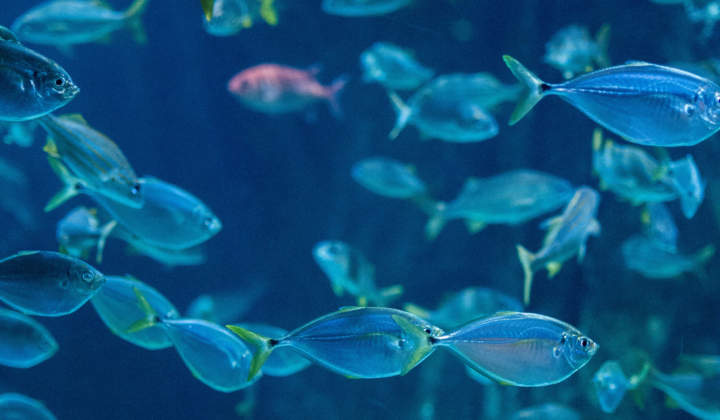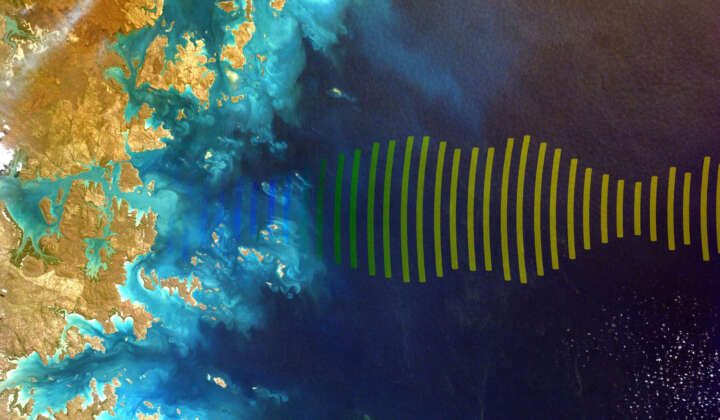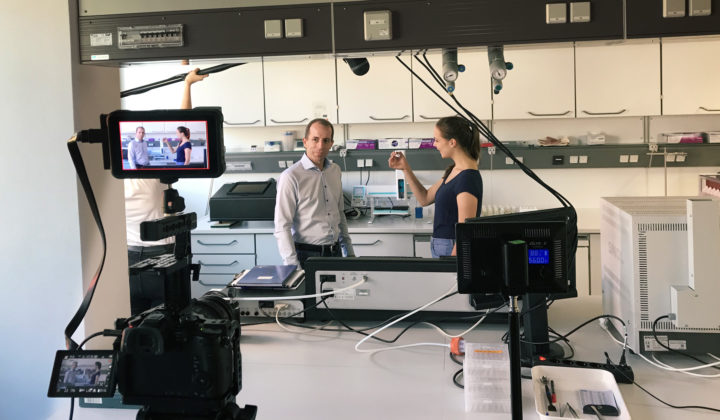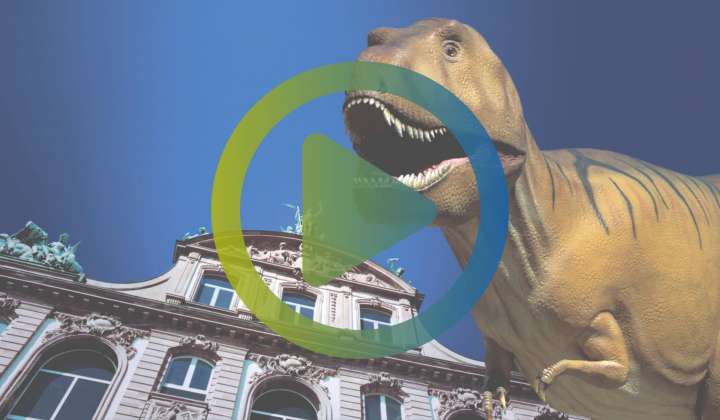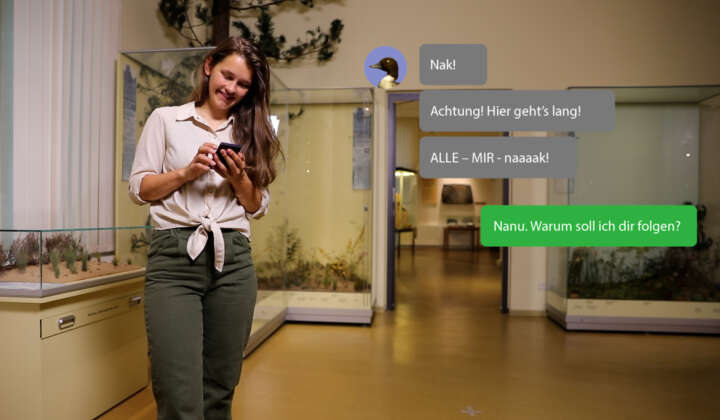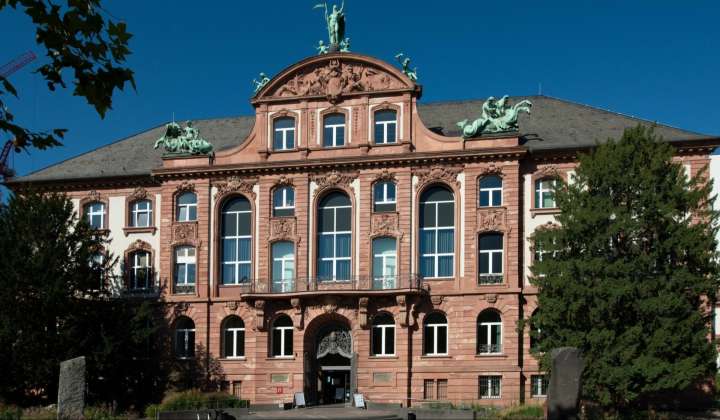
Stellen in Frankfurt
Ref. #01-24030 Meeresbiolog*in für Habitat- / Biotopcharakterisierung und Biodiversitätsmodellierung (m/w/d)
Die Senckenberg Gesellschaft für Naturforschung (SGN) wurde 1817 gegründet und zählt zu den wichtigsten Forschungseinrichtungen rund um die biologische Vielfalt. An den zwölf Standorten in ganz Deutschland betreiben Wissenschaftler*innen aus über 40 Nationen modernste Forschung auf internationaler Ebene. Hauptsitz der Gesellschaft ist die Mainmetropole Frankfurt im Herzen Deutschlands. Hier befindet sich auch eine der bekanntesten Senckenberg-Einrichtungen, das Senckenberg Naturmuseum.
Für das Forschungsprojekt RUBBLE (Rocky seafloor – Underestimated driver for Benthic Biodiversity Living in the abyss and its Evolution), einschließlich einer 6-wöchigen Tiefseeexpedition mit RV METEOR, suchen wir eine*n
Meeresbiolog*in für Habitat-/Biotopcharakterisierung und Biodiversitätsmodellierung (m/w/d)
(Vollzeit / Teilzeit ist möglich)für die Abteilung Marine Zoologie am Standort Frankfurt, beginnend am 1. Oktober 2024.
Aufgaben:- Teilnahme an einer ca. 6-wöchigen Tiefseeexpedition mit RV METEOR Ende 2024
- Unterstützung des Betriebs eines Kamerasystems für Tiefseemissionen und Meeresbodenbeprobungen (inkl. Probenaufbereitung an Bord und im Labor des Heimatinstituts)
- Datenanalysen mit dem Ziel der Charakterisierung und Rekonstruktion von Lebensräumen und Biotopen des Meeresbodens (eigene Interpretation und/oder mit geologischen und biologischen Kooperationspartnern)
- Integration von Taxon-Verteilungsdaten und Biodiversitätsdaten mit Sediment- und anderen Meeresbodenmerkmalen in die Biotopcharakterisierung und Habitat-/Biodiversitätsmodellierung.
- Analyse der Verteilungsmuster der Megafauna und ihrer Spuren auf Bildern des Meeresbodens sowie ausgewählter Makrofauna (z. B. Asseln) aus Meeresbodenproben, um die Korrelation zwischen Lebensgemeinschaften und Substrattypen im Abgrund sowie das Ausmaß der Abhängigkeit der benthischen Lebensgemeinschaften von physikalischen Faktoren zu verstehen.
- Verknüpfung von abiotischen Geländevariablen mit bestimmten Faunengemeinschaften zur Vorhersage der Verteilung von Faunengemeinschaften, um insbesondere zu prüfen, ob die Verteilung von Arten mit dem Vorkommen eines oder mehrerer Lebensraumtypen korreliert, und um schließlich Annahmen über die biologische Vielfalt des Benthos auf der Grundlage einer schiffsbasierten Lebensraumcharakterisierung zu treffen.
- Integration von Daten zur Taxonverteilung und Biodiversität mit Sediment- und anderen Merkmalen des Meeresbodens in die Biotopcharakterisierung und die Lebensraum-/Biodiversitätsmodellierung.
- Quantitative Bewertung der Verteilung von Lebensräumen und der damit verbundenen Lebensgemeinschaften am Meeresboden mit Hilfe von Vorhersagemodellen.
- Hochschulabschluss, vorzugsweise mit Doktortitel oder Ph.D., in Meeresbiologie oder verwandten Bereichen.
- Fließende Beherrschung der englischen Sprache in Wort und Schrift.
- Erfahrung mit der Modellierung der biologischen Vielfalt.
- Umfassende Ausbildung in GIS-Methoden.
- Kenntnisse von Datenvisualisierungswerkzeugen.
- Schnelle Auffassungsgabe für neue (IT-)Methoden und Beherrschung von Bildverarbeitung, Analyse und einschlägiger Software.
- Ausgeprägte Kommunikationsfähigkeiten im persönlichen Gespräch und online.
- Hervorragende Fähigkeiten zum Selbstmanagement und Flexibilität, um sich auf sich verändernde Projektanforderungen und aufkommende Hindernisse einzustellen.
Wir bieten:
- Ein dynamisches, internationales Team von Wissenschaftlern mit sammlungsbasierten Forschungsprogrammen, die sich auf neugiergetriebene Forschung und die Erhaltung der biologischen Vielfalt der Erde konzentrieren
- Ausgezeichnete Infrastrukturen und Möglichkeiten zur Zusammenarbeit, z. B. in den Bereichen Morphologie, Genomik, Evolutionsbiologie und (Paläo-)Ökologie
- Eine attraktive und herausfordernde Position in einer Forschungseinrichtung von internationalem Rang
- Möglichkeiten zur Teilnahme an Lehr- und Öffentlichkeitsarbeit, z. B. in unserem Museum und mit kooperierenden Universitäten
- Eine den Aufgaben der Stelle und der Erfahrung der Bewerberin/des Bewerbers entsprechende Besoldung nach dem Tarifvertrag für den öffentlichen Dienst des Landes Hessen
- Leben in einer pulsierenden, international ausgerichteten Stadt (750.000 Einwohner), einem weltweiten Verkehrsknotenpunkt und kulturellen Zentrum
- Flexible Arbeitszeiten – Jahressonderzahlung – betriebliche Altersvorsorge – 30 Tage Urlaub – vergünstigter ÖPNV im Rhein-Main-Gebiet – Förderung der Vereinbarkeit von Beruf und Familie (zertifiziert durch „audit berufundfamilie“).
Ort der Beschäftigung: Frankfurt am Main
Beschäftigungsumfang: Vollzeit / Teilzeit ist möglich (mind. 20, Stunden/Woche)
Art des Vertrags: befristet für einen Zeitraum von 18 Monaten, entsprechend der Verfügbarkeit von Drittmitteln
Vergütung: nach dem Tarifvertrag für das Land Hessen (Entgeltgruppe E 13, TV-H)
Senckenberg setzt sich für Vielfalt ein. Wir profitieren von den unterschiedlichen Kompetenzen, Sichtweisen und Persönlichkeiten unserer Mitarbeiterinnen und Mitarbeiter und freuen uns über jede Bewerbung von qualifizierten Bewerberinnen und Bewerbern, unabhängig von Alter, Geschlecht, ethnischer oder kultureller Herkunft, Religion und Weltanschauung, sexueller Orientierung und Identität oder Behinderung. Bewerberinnen und Bewerber mit Schwerbehinderung werden bei gleicher Eignung bevorzugt berücksichtigt. Senckenberg unterstützt aktiv die Vereinbarkeit von Beruf und Familie und legt großen Wert auf eine gleichberechtigte und inklusive Arbeitskultur.
Sie möchten sich bewerben?Dann senden Sie uns Ihre vollständigen und aussagekräftigen Bewerbungsunterlagen mit
- Motivationsschreiben
- Lebenslauf mit Publikationsliste und Kontaktinformationen für mindestens zwei Referenzen
- Zusammenfassung der bisherigen Forschungserfahrung (max. 1 Seite)
- Kopien der relevanten Zeugnisse (PhD, MSc, Promotion)
in elektronischer Form (als zusammenhängende PDF-Datei) bitte unter Angabe der Referenz #01-24030 bis zum 11.08.2024 an recruiting@senckenberg.de oder bewerben Sie sich direkt auf unserer Homepage über das Online Bewerbungsformular.
Senckenberg Gesellschaft für Naturforschung
Senckenberganlage 25
60325 Frankfurt a.M.
E-Mail: recruiting@senckenberg.de
Für weitere fachliche Informationen wenden Sie sich bitte an Dr. Torben Riehl: torben.riehl@senckenberg.de
Weitere Informationen über die Senckenberg Gesellschaft für Naturforschung finden Sie unter www.senckenberg.de.
Ref. #01-24026 Studentische Hilfskraft (w/m/d) für die Abteilung Marine Zoologie, im Projekt Senckenberg Ocean Species Alliance (SOSA)
Die Senckenberg Gesellschaft für Naturforschung (SGN) wurde 1817 gegründet und zählt zu den wichtigsten Forschungseinrichtungen rund um die biologische Vielfalt. An den zwölf Standorten in ganz Deutschland betreiben Wissenschaftler*innen aus über 40 Nationen modernste Forschung auf internationaler Ebene. Hauptsitz der Gesellschaft ist die Mainmetropole Frankfurt im Herzen Deutschlands. Hier befindet sich auch eine der bekanntesten Senckenberg-Einrichtungen, das Senckenberg Naturmuseum.
Die Senckenberg Gesellschaft für Naturforschung mit Hauptsitz in Frankfurt am Main sucht zum nächstmöglichen Zeitpunkt für die Abteilung Marine Zoologie, im Projekt Senckenberg Ocean Species Alliance (SOSA) am Standort Frankfurt am Main eine
studentische Hilfskraft (m/w/d)
(bis zu 39 Stunden im Monat)
SOSA verbindet marine Biodiversitätsforschung, Artenschutz und Wissenschaftskommunikation mittels eines neuartigen integrativen Ansatzes, dessen Ziele die Unterstützung der wissenschaftlichen Dokumentation, sowie der Förderung des öffentlichen Bewusstseins und der Begeisterung für marine Artenvielfalt sind. Dieses interdisziplinäre Projekt besteht aus drei Säulen, der Discovery Unit, der Red Listing Unit und der Engagement Unit, deren Aufgaben komplementär und eng miteinander verknüpft sind.
Die Discovery Unit entwickelt und testet ein neuartiges Modell der Biodiversitätsarbeit, indem sie Nutzer*innen innerhalb und außerhalb von Senckenberg taxonomische Dienstleistungen anbietet, um die bisher größtenteils noch unbekannte Artenvielfalt unserer Ozeane effektiver zu erfassen.
Ihre Aufgaben
- (Online-)recherche zu aktueller taxonomischer Literatur über wichtige Großgruppen mariner wirbelloser Tiere (Evertebrata)
- Mitarbeit an der Erstellung von Artbeschreibungstemplates und -protokollen
- Unterstützung bei der Erhebung von Daten (u. a. Fotografie und Vermessung konservierter Exemplare und/oder Präparate), die zur Beschreibung neuer Arten durch interne und externe Klienten benötigt werden
- Digitale Bildbearbeitung in Adobe Photoshop, GIMP, oder vergleichbaren Softwares (optional)
- Anfertigung und Digitalisierung mikroskopischer Zeichnungen von Tieren und Präparaten (optional)
Ihre Qualifikationen
- (BSc-)Abschluss in Biologie, idealerweise Zoologie (Grundkenntnisse tierischer Großgruppen und deren Merkmale)
- Interesse an Wirbellosen und deren Bauplänen
- Gute Englischkenntnisse zur Erhebung und Zusammenfassung taxonomischer, großteils englischsprachiger Fachpublikationen)
- Genaues, strukturiertes und gewissenhaftes Arbeiten
- Kenntnisse in MS Office, v. a. Excel und Word, zur Erstellung von Merkmalszusammenfassungen und Beschreibungsvorlagen
- Geschick im Umgang mit fragilen Exemplaren und Präparaten
- Grundkenntnisse in Mikroskopie, digitaler Fotografie und Bildbearbeitung sind von Vorteil
Ort: Frankfurt am Main
Beschäftigungsumfang: bis zu 39 Stunden im Monat
Vertragsart: zunächst befristet für 1 Jahr
Vergütung: 13,53 Euro / Stunde
Senckenberg setzt sich für Vielfalt ein. Wir profitieren von den unterschiedlichen Kompetenzen, Sichtweisen und Persönlichkeiten unserer Mitarbeiter*innen und freuen uns über jede Bewerbung von qualifizierten Bewerber*innen, unabhängig von Alter, Geschlecht, ethnischer oder kultureller Herkunft, Religion und Weltanschauung, sexueller Orientierung und Identität oder Behinderung. Bewerber*innen mit einer Schwerbehinderung werden bei gleicher Eignung besonders berücksichtigt. Senckenberg unterstützt aktiv die Vereinbarkeit von Beruf und Familie und legt großen Wert auf eine gleichberechtigte und inklusive Arbeitskultur.
Sie möchten sich bewerben?
Dann senden Sie uns Ihre vollständigen und aussagekräftigen Bewerbungsunterlagen (Anschreiben, detaillierter Lebenslauf, Ausbildungs- und Arbeitszeugnisse) in elektronischer Form (als zusammenhängende PDF-Datei) bitte unter Angabe der Referenz #01-24026 bis zum 04.08.2024 an recruiting@senckenberg.de oder bewerben Sie sich direkt auf unserer Homepage über das Online Bewerbungsformular.
Senckenberg Gesellschaft für Naturforschung
Senckenberganlage 25
60325 Frankfurt a.M.
E-Mail: recruiting@senckenberg.de
Für fachliche Rückfragen zur Stelle steht Ihnen Herr Dr. Jan Steger unter jan.steger@senckenberg.de gerne zur Verfügung.
Weitere Informationen über die Senckenberg Gesellschaft für Naturforschung sowie SOSA finden Sie unter www.senckenberg.de bzw. https://sosa.senckenberg.de/.
Ref. #01-24022 Programmierer*in (m/w/d) mit Schwerpunkt Frontend-Entwicklung und Integration von Machine Learning Services
Die Senckenberg Gesellschaft für Naturforschung (SGN) wurde 1817 gegründet und zählt zu den wichtigsten Forschungseinrichtungen rund um die biologische Vielfalt. An den elf Standorten in ganz Deutschland betreiben Wissenschaftler*innen aus über 40 Nationen modernste Forschung auf internationaler Ebene. Hauptsitz der Gesellschaft ist die Mainmetropole Frankfurt im Herzen Deutschlands. Hier befindet sich auch eine der bekanntesten Senckenberg-Einrichtungen, das Senckenberg Naturmuseum.
Wir suchen zur Verstärkung unseres Software-Entwicklungsteams für Biodiversitäts-Informatik ab sofort am Standort Frankfurt eine*n
Programmierer*in (m/w/d) mit Schwerpunkt Frontend-Entwicklung und Integration von Machine Learning Services
Das sind Ihre Herausforderungen
Unser Team ist am Aufbau nationaler und internationaler Forschungsdateninfrastrukturen beteiligt, die Senckenbergs Forschungsdaten aus den Bereichen Geo- und Biodiversität nachhaltig und interdisziplinär
bereitstellen. So sind wir im Rahmen des Projektes “DiSSCo Transition“ am Aufbau einer europaweiten Infrastruktur für Digitalisierung und web-basierte Veröffentlichung von Datenbeständen aus naturwissenschaftlichen Sammlungen (Museen, Living Collections wie botanischen Gärten sowie
Gewebesammlungen) beteiligt. Ziel ist der Aufbau einer Infrastruktur für die verteilte Pflege, Annotation und Mobilisierung von Biodiversitätsdaten unter Einbeziehung von Machine Learning zur Extraktion und Quantifizierung von Merkmalsausprägungen (Traits) aus Digitalisaten .
Unser Forschungsdatenmanagement orientiert sich insbesondere an den FAIR-Prinzipien (https://www.gofair.org/fair-principles) und darauf aufbauenden Technologien für die web-basierte Bereitstellung von Forschungsdaten wie RO-Crate (https://www.researchobject.org/ro-crate).
Primäre Aufgabe der ausgeschriebenen Stelle ist die Entwicklung und Implementierung von web-basierten User Interfaces für Machine Learning Services sowie Integration zusätzlicher Funktionalität wie Crowdsourcing-basierte Überarbeitung von automatisierten Bildannotationen durch Citizen Scientists (Humans-in-the-Loop, Prototype: https://wildlive.senckenberg.de).
Die Projektstelle ist Teil unserer wissenschaftlichen IT mit Expert*innen in den Bereichen Forschungsdatenmanagement, Service Development, Biosemantics und Machine Learning am SenckenbergStandort Frankfurt, so dass eine umfassende Einarbeitung in die entsprechenden Themenbereiche
gewährleistet ist.
Das erwarten wir
- Begeisterung für die web-basierte Frontend-Entwicklung, mit Fokus auf professionellem UI-Design und Usability
- Abgeschlossenes Uni/FH-Studium der Fachrichtung Informatik, Bioinformatik, Geoinformatik oder vergleichbare Qualifikation mit Bezug zur Frontend und Service-Entwicklung
- Gute Kenntnisse und praktische Erfahrung in der Programmierung (JavaScript, Python, Java), idealerweise bereits Erfahrungen mit entsprechenden Frameworks zur Implementierung von Frontends (Vue.js, React, Flask, Django, FastAPI)
- Kenntnisse im Bereich APIs sowie entsprechenden Spezifikationen (OpenAPI)
- Kenntnisse im Umgang mit Systemen zur Versionskontrolle und Containerisierung (Git, Docker)
- Idealerweise Kenntnisse im Bereich Machine Learning sowie entsprechenden Frameworks (z.B. PyTorch sowie darauf aufbauend Detectron2 und PyTorch Geometric).
- Gute Kommunikationsfähigkeiten und die Fähigkeit Softwarelösungen eigenständig, aber in enger Diskussion mit Kooperationspartner*innen umzusetzen
- Fähigkeit zur selbstständigen Koordination von Teilprojekten im wissenschaftlichen Umfeld, inklusive Organisation von Meetings mit Projektbeteiligten
- Teamorientierte und flexible Arbeitsweise, idealerweise mit der Bereitschaft zu Dienstreisen für Trainings, Meetings und Präsentationen
Wir bieten Ihnen
- Arbeit mit bewährten Technologien wie Flask, React, Vue.js, Cordra, PyTorch, MongoDB, PostgresQL, Gitlab, Docker
- eine attraktive und herausfordernde Tätigkeit in einem motivierten, dynamischen Team
- selbstständiges Handeln in einem internationalen und professionellen Umfeld
- Flexible Arbeitszeiten – Möglichkeit zum mobilen Arbeiten – Unterstützung bei Kinderbetreuung oder bei der Pflege von Familienangehörigen (zertifiziert durch das „audit berufundfamilie“) –
Dienstausweis in Verbindung mit kostenfreiem Eintritt in alle städtischen Museen – Jahressonderzahlung – betriebliche Altersvorsorge
Ort: Frankfurt am Main
Beschäftigungsumfang: Vollzeit/Teilzeit möglich
Vertragsart: befristet für 18 Monate
Vergütung: nach TV-H (voraussichtliche Entgeltgruppe E 11-13) – je nach
Qualifikation
Senckenberg engagiert sich für Vielfalt. Wir profitieren von den unterschiedlichen Expertisen, Perspektiven und Persönlichkeiten unserer Mitarbeiter*innen und freuen uns über jede Bewerbung qualifizierter
Kandidat*innen, unabhängig von Alter, Geschlecht oder geschlechtlicher Identität, ethnischer oder kultureller Herkunft, Religion und Weltanschauung, sexueller Orientierung und Identität oder Behinderung. Frauen sind besonders aufgefordert, sich zu bewerben, da sie im Bereich dieser Position unterrepräsentiert sind; bei gleicher Qualifikation und Eignung werden sie bevorzugt eingestellt. Bewerber*innen mit einer Schwerbehinderung werden bei gleicher Eignung besonders berücksichtigt. Senckenberg unterstützt aktiv
die Vereinbarkeit von Beruf und Familie und legt großen Wert auf eine gleichberechtigte und inklusive Kultur der Zusammenarbeit.
Sie möchten sich bewerben?
Dann senden Sie Ihre vollständigen und aussagekräftigen Bewerbungsunterlagen (Motivationsschreiben, CV, Ausbildungs- und Arbeitszeugnisse), in elektronischer Form (als zusammenhängende PDF-Datei) bitte unter Angabe der Referenznummer #01-24022 bis zum 05.08.2024 an:
Senckenberg Gesellschaft für Naturforschung
Senckenberganlage 25
60325 Frankfurt a.M.
E-Mail: recruiting@senckenberg.de
Für fachliche Rückfragen steht Ihnen Herr Dr. Claus Weiland (claus.weiland@senckenberg.de) gerne zur Verfügung
Ref. #12-24005-1 ERC-funded PhD and Postdoc Positions in Comparative Genomics (m/f/d)
The Hiller Lab at the LOEWE Center for Translational Biodiversity Genomics (TBG) in Frankfurt, Germany has two openings for a PhD student and/or a Postdoc to work on the BATPROTECT project to investigate the genomic basis of long healthspans, disease resistance, and viral tolerance in bats.
BATPROTECT is a 6-year funded ERC synergy grant project that will use bats as natural models of healthy aging and disease tolerance to elucidate the molecular mechanisms behind bats’ exceptional longevity and resistance to viral and age-related diseases. BATPROTECT brings together a team of global leaders in bat biology and ageing (Emma Teeling, Dublin), bat immunology and virology (Linfa Wang, Singapore), evolution and genomics (Michael Hiller, Frankfurt), and ageing model organisms (Bjoern Schumacher, Cologne) that will jointly investigate aging and immune responses in bats from the wild
and captive colonies, discover genes with evolutionary importance for longevity and disease resistance, and functionally validate longevity and immune regulators in stem and differentiated cells of bats and model organisms, with the ultimate goal to uncover new directions to improve human
healthspan and disease outcome.
The Project
The overall goal is to uncover the genomic basis of exceptional healthspans and disease tolerance in bats, understand the evolution of these traits, and identify key molecular targets for functional validation. To this end, we will assemble ~150 new reference-quality bat genomes using HiFi and HiC sequencing to better cover the diversity of bats, generate comparative transcriptomic datasets, and analyze these data using our established methods repertoire (TOGA and others). Work includes phylogenomics, performing comparative screens to identify key adaptations in coding and non-coding (miRNA) genes as well as differences in gene expression patterns across the bat phylogeny,
associating genomic changes with longevity and viral reservoir status traits, identifying novel bat genes, and investigating endogenized viral elements. The exact project will be defined based on the interests of the applicants.
The PhD student and postdoc will work closely with other members of the BATPROTECT team, the Hiller lab, and other Bat1K collaborators. We also offer exchanges with the other BATPROTECT labs as well as yearly retreats with all project members.
Your profile
- Master or PhD degree in bioinformatics/computational biology, genomics or a related area
- Solid programming skills in a Linux environment, experience with shell scripts and Unix tools
- Strong interest in comparative genomics, experience in comparative genomics is an advantage
- English in written and oral form
Our lab
The mission of our lab is to understand how nature’s fascinating phenotypic diversity has evolved and how it is encoded in the genome. Work in the lab includes sequencing and assembly of referencequality genomes, genome alignment and gene annotation, development and application of
comparative genomic methods to discover differences in genes and gene expression, and the use of statistical approaches to link phenotypic to genomic changes.
Our lab is part of TBG (https://tbg.senckenberg.de/) and the Senckenberg Research Society (https://www.senckenberg.de/en/), and is based near the city center of Frankfurt am Main, Germany. TBG provides access to cutting-edge computational (large HPC clusters, genome browser) and lab
infrastructure to sequence and analyze genomes. English is the working language in our lab.
Senckenberg and TBG provide
- Flexible working hours – opportunities for mobile working – leave of absence due to family reasons (certified by “auditberufundfamilie”) – parent-child office – annual special payment – company pension scheme – Senckenberg badge for free entry in museums in Frankfurt. – leave
of 30 days/year - Frankfurt is a vibrant and highly international city at the heart of Europe that combines a skyscraper skyline with ample parks and green areas.
- The Economist 2022 index ranked Frankfurt among the top 10 most livable cities worldwide.
Place of employment: Frankfurt am Main
Working hours: Full-time (40 hours/week) / part-time options are available
Type of contract: funding is available for 6 years
Postdoc: initially limited to 2 years
PhD: initially limited to 3 years
Start date: flexible, ideally summer of 2024
Salary and benefits: according to the collective agreement of the State of Hesse (TV-H), pay grade E13 (PostDoc 100%, PhD: 75%)
Senckenberg is committed to diversity. We benefit from the different expertise, perspectives and personalities of our staff and welcome every application from qualified candidates, irrespective of age, gender, ethnic or cultural origin, religion and ideology, sexual orientation and identity or disability.
Women are particularly encouraged to apply, as they are underrepresented in the field of this position; in the case of equal qualifications and suitability they will be given preference. Applicants with disabilities (“Schwerbehinderung”) will be given preferential consideration in case of equal suitability.
Senckenberg actively supports the compatibility of work and family and places great emphasis on an equal and inclusive work culture.
The Senckenberg Gesellschaft für Naturforschung is a member of the Leibniz Association and is based in Frankfurt am Main, Germany. LOEWE-TBG is a joint venture of Senckenberg with five partner institutes from the Federal State of Hesse, aiming to intensify biodiversity genomics in basic and
applied research. We establish a new and taxonomically broad genome collection to study genomic and functional diversity across the tree of life and make genomic resources accessible for societal demand driven applied research.
How to apply
Please send us your application documents containing
- a CV with publication list and contact information for at least two references
- a summary of previous research experience (max 1 page)
- and copies of certificates, transcripts and grades in electronic form (as a coherent PDF file) by August 31st to recruiting@senckenberg.de quoting the reference number #12-24005-1, or apply through the online application form on our homepage.
Senckenberg Gesellschaft für Naturforschung
Senckenberganlage 25
60325 Frankfurt a.M.
E-Mail: recruiting@senckenberg.de
For more information about the lab and the project, please contact Prof. Dr. Michael Hiller (michael.hiller@senckenberg.de) or visit the lab webpage https://tbg.senckenberg.de/hillerlab/. An overview about our publications is available here: https://tbg.senckenberg.de/hillerlab/publications/
Stellen in Wilhelmshaven
Ref.#02-24004 Lab and project manager (m/f/d) of marine NextGen sequencing projects
At the Senckenberg German Center for Marine Biodiversity Research (DZMB) in Wilhelmshaven we are looking to hire as soon as possible a
Lab and project manager (m/f/d) of marine NextGen sequencing projects
(full-time position / part-time options available)
Your tasks
- Supporting and consulting PIs in DNA and library preparation for metabarcoding, e-DNA, RAD sequencing, or high throughput amplicon sequencing, and other applications like de novo genome and transcriptome sequencing of marine organisms
- Developing strategies for high-quality DNA isolation and quantification from marine organism of difficult sources (meio and macrobenthos, zooplankton, Dinophyceae, deep-sea)
- Supporting PIs with bioinformatic analysis of Illumina runs (MiSeq, NextSeq), and prepare results and analyses for reports and scientific publications
- Being responsible for organizing, operating, maintaining, and enhancing the NextGen Laboratory infrastructure in Wilhelmshaven (PCR and qPCR machines, MiSeq sequencer, Nanopore, Tape Station, etc.)
- Organizing and documenting sample preparation and NextGen sequencing for internal and external partners
- Manage communication with research groups (Universities, KDM and DAM Institutes), service providers and database managers
- Participating and organizing sampling campaigns for NextGen projects at sea, responsible for sampling gears and sampling design at sea
- Contribute to Senckenberg’s research portfolio including our focus on “Anthropocene Biodiversity Loss”
- Contribute to organization-wide administrative roles relating to research (e.g. participation on internal and external committees, public outreach initiatives,)
- Willingness to participate in marine expeditions
Your Qualification
- Scientific degree (Master of Science) preferably on a marine topic using molecular methods
- Illumina training certificate and experience with operating NextGen sequencing platforms (e.g. MiSeq)
- Experience with library preparation (transcriptomes, metabarcoding, e-DNA, RAD sequencing) and quantification methods (Tape Station, Qbit, qPCR)
- Knowledge and experience in organizing, operating, maintaining, and enhancing laboratory infrastructure
- Experience with demultiplexing and statistical analyses of Illumina Libraries
- Programming experience for NextGen analysis using script languages (R, BASH, sed, Python)
- Experience with writing bioinformatic scripts for parallel computing on distributed UNIX/Linux clusters
- Experience with Managing NextGen sequencing projects with external partners
- Experience and solid understanding of DNA and NextGen sequencing technology
- Sea-going expedition experience on research vessels and solid understanding of sampling methods and sampling design for marine communities
- Highly service orientated with excellent communication skills
What is awaiting you?
- An interesting task in a dynamic team of researchers in an international research institution
- The opportunity to gain experience in the above-mentioned research field
- Occasion to build a network with scientists in interdisciplinary fields
- flexible working hours – mobile working – support with child care or care for family members (certified by the „audit berufundfamilie“) – a company badge – annual special payment according to the public service tariff – annual paid leave of 30 days – company pension scheme
Place of employment: Wilhelmshaven (Lower Saxony)
Working hours: Full time position (40 weekly working hours) / part time options are available (minimum 75%)
Type of contract: Start of contract is ideally as soon as possible; the contract is initially limited for 2 years, and can be made permanent after this period
Remuneration: According to the public service tariff TV-H E 11 – E 12 (depending on qualification and experience)
Senckenberg is committed to diversity. We benefit from the different expertise, perspectives and personalities of our staff and welcome every application from qualified candidates, irrespective of age, gender, ethnic or cultural origin, religion and ideology, sexual orientation and identity or disability. Applicants with a severe disability will be given special consideration in case of equal suitability. Senckenberg actively supports the compatibility of work and family and places great emphasis on an equal and inclusive work culture.
We welcome your application!
Please send your complete and comprehensive application (letter of motivation with a short description of your previous and current research foci, a CV, certificates of academic achievements as well as letters of recommendation) electronically (as a single PDF) to recruiting@senckenberg.de mentioning the reference number #02-24004 by 14.08.2024.
Alternatively, you can apply directly through our online application form at our home page www.senckenberg.de/de/karriere/bewerbung/.
Senckenberg Gesellschaft für Naturforschung
Senckenberganlage 25
60325 Frankfurt a.M.
E-Mail: recruiting@senckenberg.de
For specific questions regarding the position, please contact Prof. Dr. Pedro Martínez Arbizu pedro.martinez@senckenberg.de.
For more information about the Senckenberg Research Society please visit http://www.senckenberg.de.
The Senckenberg Gesellschaft für Naturforschung (SGN) was founded in 1817 and is one of the most important research institutions in the field of biodiversity. At its locations throughout Germany, scientists from over 40 nations conduct cutting-edge research on an international scale. Senckenberg am Meer in the port city of Wilhelmshaven is the northernmost institute of the society. It cooperates with important research institutions in German marine research as well as colleges and universities. Located directly on the North Sea, the Wilhelmshaven site also offers local recreation in unspoilt nature as well as a wide range of cultural activities.
